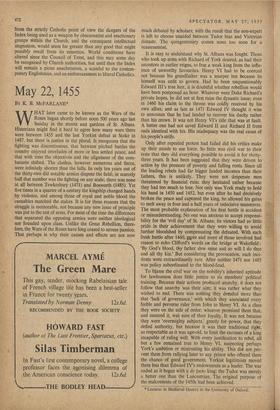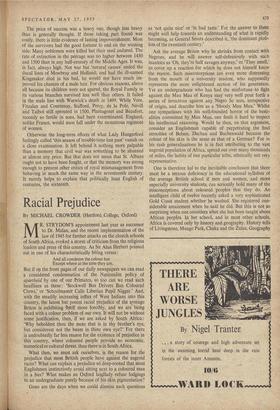BY K. B. McFARLANE* W HAT later came to be known
as the Wars of the Roses began shortly before noon 500 years ago last Sunday in the streets and gardens of St. Albans. Historians might find it hard to agree how many wars there were between 1455 and the last Yorkist defeat at Stoke in 1487, but there is justice in the plural. It recognises that the fighting was discontinuous, that between pitched battles the country enjoyed interludes of more or less settled peace, and that with time the objectives and the alignment of the com- batants shifted. The clashes. however numerous and fierce, were infinitely shorter than the lulls. In only ten years out of the thirty-two did notable armies dispute the field; in scarcely half that number was the fighting on any scale; there was none at all between Tewkesbury (1471) and Bosworth (1485). Yet five times in a quarter of a century the kingship changed hands by violence, and among those of royal and noble blood the casualties matched the stakes. It is for these reasons that the struggle is memorable, not because any new issue of principle was put to the test of arms. For most of the time the differences that separated the opposing armies were neither ideological nor founded upon class. Unlike the Great Rebellion, there- fore, the Wars of the Roses have long ceased to arouse passion. That perhaps is why their causes and effects are not now much debated by scholars; with the result that the non-expert is left to choose unaided between Tudor bias and Victorian distaste. The quingentenary comes none too soon for a reassessment.
It is easy to understand why St. Albans was fought. Those who took up arms with Richard of York desired, as had their ancestors in earlier reigns, to free a weak king from the influ- ence of unworthy favourites. Henry VI had to be coerced not because his grandfather was a usurper but because he himself was unfit to govern. Had he been unquestionably Edward Ill's true heir, it is doubtful whether rebellion would have been postponed an hour. Whatever were Duke Richard's private hopes, he did not at first raise the dynastic issue; even in 1460 his claim to the throne was coldly received by his own allies; and as late as 1471 Edward IV thought it wise to announce that he had landed to recover his duchy rather than his crown. It was not Henry VI's title that was at fault. A better one had not saved Edward II and Richard II from ends identical with his. His inadequacy was the real cause of his people's strife.
Only after repeated protest had failed did his critics make up their minds to use force. So little was civil war to their taste that they did everything possible to avoid it for thirty- three years. It has been suggested that they were driven to action by the pressure of poverty and falling rents. Since all the leading rebels had far bigger landed incomes than their fathers, this is unlikely. They were not desperate men threatened by financial ruin; they hesitated rather because they had too much to lose. Not only was York ready to hold his hand in 1450 and 1452, but even after he had decisively broken the peace and captured the king, he allowed his gains to melt away in four and a half years of indecisive manoeuvre. The most probable explanation of his first battle is accident or misunderstanding. No one was anxious to accept responsi- bility for the `evil day' of St. Albans; its victors had so little pride in their achievement that they were willing to avoid further bloodshed by compensating the defeated. With each fresh battle after 1460, =pre and more of those involved had reason to echo Clifford's words on the bridge at Wakefield: 'By God's blood, thy father slew mine and so will I do thee and all thy kin.' But considering the provocation, such inci- dents were extraordinarily rare. After neither 1471 nor 1485 was policy subordinated to the blood-feud. The price of success was a heavy one, though less heavy than is generally thought. If those taking part found war costly, there is little evidence of lasting impoverishment. Most of the survivors had the good fortune to end on the winning side. Many noblemen were killed but their seed endured. The rate of extinction in the peerage was no higher between 1450 and 1500 than in any half-century of the Middle Ages. It was, in fact, always high. Not war but 'natural causes' ended the ducal lines of Mowbray and Holland; and had thii ill-named Kingmaker died in his bed, he would not have much im- proved his chances of a male heir. For obvious reasons, above all because its children were not spared, the Royal Family in its various branches survived less well than others. It failed in the male line with Warwick's death in 1499. While Vere, Fitzalan and Courtenay. Stifford, Percy, de la Pole, Nevill and Talbot still sprouted in 1500, Plantagenet and Beaufort, recently so fertile in sons, had been exterminated. England, unlike France, would soon fall under the monstrous regiment of women.
Otherwise the long-term effects of what Lady Hungerford feelingly called 'this season of trouble-time last past' vanish on a close examination. It left behind it_ nothing more palpable than a memory that civil war was something to be shunned at almost any price. But that does not mean that St. Albans ought not to have been fought, or that the memory was strong enough to prevent other critics of royal mismanagement from behaving in much the same way in the seventeenth Century. It merely helps to explain that politically least English of centuries, the sixteenth.



































 Previous page
Previous page